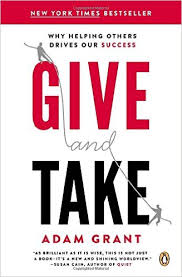Great conversations start with a question, so here is one:
In approaching relationships with others, are you more of a Giver or a Taker?
I look forward to asking a group this question; I imagine a room full of leaders, and my prediction is 70% would identify themselves as givers. After all the talk of servant leadership – and Jim Collins’ research shared in Good to Great that connects an organization’s success with the presence of a level 5 leader (his term for servant leader) – a majority of leaders would put their hands up because we all know what we ought to do.
I’ve just finished Adam Grant’s book, Give and Take: Why Helping Others Drives Our Success. He shares two lists of values that he uses in his research to help identify a primary style. He considers how an individual rates the importance of each of the following:
List 1
- Wealth (money, material possessions)
- Power (dominance, control over others)
- Pleasure (enjoying life)
- Winning (doing better than others)
List 2
- Helpfulness (working for the well-being of others)
- Responsibility (being dependable)
- Social justice (caring for the disadvantaged)
- Compassion (responding to the needs of others)
As you look at these lists, does it change how you would answer this question? In the last evaluation where you received feedback, which list did it point to?
The two books that stand out for me on this topic are The Servant: A Simple Story About the True Essence of Leadership by James C. Hunter and The Go-Giver: A Little Story About a Powerful Business Idea by Bob Burg and John David Mann. While I loved both of these, the Adam Grant book I just finished stands out because of the academic approach the author takes in sharing the research behind givers and takers and, in the end, how he uses research to answer the question – Who achieves a higher level of performance and/or impact?
Of course he includes an assessment, with the option to get input from others. I scored a 66% Giver and 33% Taker on my self-assessment (Whew!). Now the hard-er part: asking others for their input. If you have seen my JoHari Window tutorial, this is the part where we ask for feedback to reveal blindspots. Look for that in another post . . .
So, are you a Giver or a Taker? Take 5 minutes to take the self-assessment.
People-centered leaders are not perfect, but they are purposeful about creating space where ‘List 2’ needs are mentioned and met.
Listen . . . Lead. Repeat often!
Final thought for EOS leaders – Look for a future post focused on the habits that are part of the EOS (Entrepreneurial Operating System) and how leaders can make certain behaviors habits.

